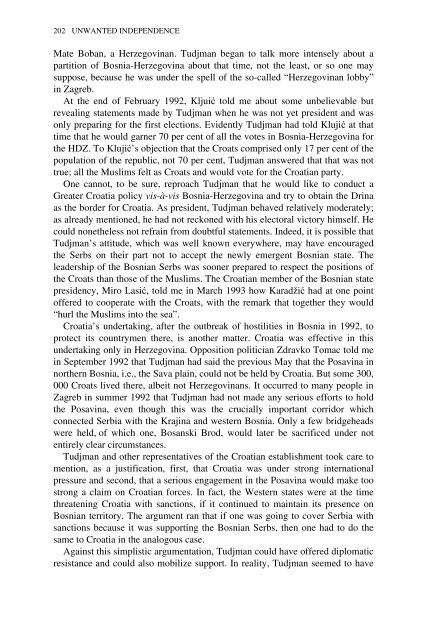Yugoslavia: A History of its Demise - Indymedia
Yugoslavia: A History of its Demise - Indymedia
Yugoslavia: A History of its Demise - Indymedia
Create successful ePaper yourself
Turn your PDF publications into a flip-book with our unique Google optimized e-Paper software.
202 UNWANTED INDEPENDENCE<br />
Mate Boban, a Herzegovinan. Tudjman began to talk more intensely about a<br />
partition <strong>of</strong> Bosnia-Herzegovina about that time, not the least, or so one may<br />
suppose, because he was under the spell <strong>of</strong> the so-called “Herzegovinan lobby”<br />
in Zagreb.<br />
At the end <strong>of</strong> February 1992, Kljuić told me about some unbelievable but<br />
revealing statements made by Tudjman when he was not yet president and was<br />
only preparing for the first elections. Evidently Tudjman had told Klujić at that<br />
time that he would garner 70 per cent <strong>of</strong> all the votes in Bosnia-Herzegovina for<br />
the HDZ. To Klujić’s objection that the Croats comprised only 17 per cent <strong>of</strong> the<br />
population <strong>of</strong> the republic, not 70 per cent, Tudjman answered that that was not<br />
true; all the Muslims felt as Croats and would vote for the Croatian party.<br />
One cannot, to be sure, reproach Tudjman that he would like to conduct a<br />
Greater Croatia policy vis-à-vis Bosnia-Herzegovina and try to obtain the Drina<br />
as the border for Croatia. As president, Tudjman behaved relatively moderately;<br />
as already mentioned, he had not reckoned with his electoral victory himself. He<br />
could nonetheless not refrain from doubtful statements. Indeed, it is possible that<br />
Tudjman’s attitude, which was well known everywhere, may have encouraged<br />
the Serbs on their part not to accept the newly emergent Bosnian state. The<br />
leadership <strong>of</strong> the Bosnian Serbs was sooner prepared to respect the positions <strong>of</strong><br />
the Croats than those <strong>of</strong> the Muslims. The Croatian member <strong>of</strong> the Bosnian state<br />
presidency, Miro Lasić, told me in March 1993 how Karadžić had at one point<br />
<strong>of</strong>fered to cooperate with the Croats, with the remark that together they would<br />
“hurl the Muslims into the sea”.<br />
Croatia’s undertaking, after the outbreak <strong>of</strong> hostilities in Bosnia in 1992, to<br />
protect <strong>its</strong> countrymen there, is another matter. Croatia was effective in this<br />
undertaking only in Herzegovina. Opposition politician Zdravko Tomac told me<br />
in September 1992 that Tudjman had said the previous May that the Posavina in<br />
northern Bosnia, i.e., the Sava plain, could not be held by Croatia. But some 300,<br />
000 Croats lived there, albeit not Herzegovinans. It occurred to many people in<br />
Zagreb in summer 1992 that Tudjman had not made any serious efforts to hold<br />
the Posavina, even though this was the crucially important corridor which<br />
connected Serbia with the Krajina and western Bosnia. Only a few bridgeheads<br />
were held, <strong>of</strong> which one, Bosanski Brod, would later be sacrificed under not<br />
entirely clear circumstances.<br />
Tudjman and other representatives <strong>of</strong> the Croatian establishment took care to<br />
mention, as a justification, first, that Croatia was under strong international<br />
pressure and second, that a serious engagement in the Posavina would make too<br />
strong a claim on Croatian forces. In fact, the Western states were at the time<br />
threatening Croatia with sanctions, if it continued to maintain <strong>its</strong> presence on<br />
Bosnian territory. The argument ran that if one was going to cover Serbia with<br />
sanctions because it was supporting the Bosnian Serbs, then one had to do the<br />
same to Croatia in the analogous case.<br />
Against this simplistic argumentation, Tudjman could have <strong>of</strong>fered diplomatic<br />
resistance and could also mobilize support. In reality, Tudjman seemed to have
















